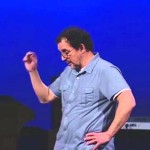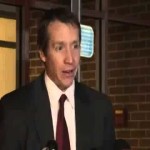We run our website the way we wished the whole internet worked: we provide high quality original content with no ads. We are funded solely by your direct support. Please consider supporting this project.
A Rational Defense of Belief in God
The New York Times recently posted a review of Alvin Plantinga’s book, Where the Conflict Really Lies: Science, Religion, and Naturalism. In it, Plantinga argues on philosophical grounds that, among other things, theism is not in conflict with science, that a belief in naturalism along with evolution is contradictory, and that “Faith…is another basic way of forming beliefs, distinct from but not in competition with reason, perception, memory, and the others.” It’s a dense, but great read. The video above is a short interview with Plantinga that is also illuminating.
From the book review:
Plantinga holds that miracles are not incompatible with the laws of physics, because those laws determine only what happens in closed systems, without external intervention, and the proposition that the physical universe is a closed system is not itself a law of physics, but a naturalist assumption. Newton did not believe it: he even believed that God intervened to keep the planets in their orbits. Plantinga has a lengthy discussion of the relation of miracles to quantum theory: its probabilistic character, he believes, may allow not only miracles but human free will. And he considers the different interpretations that have been given to the fine-tuning of the physical constants, concluding that the support it offers for theism is modest, because of the difficulty of assigning probabilities to the alternatives. All these discussions make a serious effort to engage with the data of current science. The arguments are often ingenious and, given Plantinga’s premises, the overall view is thorough and consistent.
The interest of this book, especially for secular readers, is its presentation from the inside of the point of view of a philosophically subtle and scientifically informed theist—an outlook with which many of them will not be familiar. Plantinga writes clearly and accessibly, and sometimes acidly—in response to aggressive critics of religion like Dawkins and Daniel Dennett. His comprehensive stand is a valuable contribution to this debate.
Category: General
Tags: Belief, Evolution, Faith, Naturalism, Philosophy, Science
Related Reading

Sermon Clip: Waking from Oz
In this unique sermon clip, Greg Boyd explains to us his “Theory of OZ” based on the movie Wizard of Oz. In the movie Wizard of Oz, the characters are all looking for something they think they need. As Christians, we do the same. Whether it’s a new job, a marriage, a lack of a…

When Free Will Meets Unfathomable Evil
In the face of tragedy Christians unfortunately tend to recite clichés that attempt to reassure people that, however terrible things seem, everything is unfolding according to God’s mysterious plan. We hear that “God has his reasons”; “God’s ways are not our ways”; “God is still on his throne”; “God doesn’t make mistakes,” and things of…

Podcast: Did You Believe in Evolution When You Wrote Letters from a Skeptic?
Greg considers how to think about God’s relationship to time given that there are apparent paradoxes no matter how one things about it. http://traffic.libsyn.com/askgregboyd/Episode_0319.mp3

Can Science Inform Our Theology?
Over the last century, we have witnessed a revolution in various areas of science that relate to how we see the world and even God. For example, the Platonic notion that time and change are less real than timeless stability is being abandoned in light of the fact that physicists work from the assumption that…

Is Suffering Part of God’s Secret Plan?
In the Christian tradition since Augustine, the most common explanation for the apparent arbitrariness of life and God’s interaction with humanity has been God’s mysterious will—his “secret plan,” as Calvin says. Whether or not a child is born healthy or a wife is killed by an intruder is ultimately decided by God. If we ask…

Believing Is Not Enough
One of the core elements of evangelical church life is the conversion experience. From old-time revivals, to seeker-sensitive church services, to post-modern outreach strategies, evangelicals have placed a very high emphasis on the point of conversion. This practice is based on a theological perspective; it’s not just a tactic to get people in the church.…
